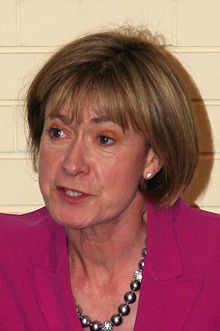Mary Davis | |
|---|---|
 | |
| Chief Executive Officer of Special Olympics International | |
| Assumed office 9 May 2016 | |
| Preceded by | Timothy Shriver |
| Member of the Council of State | |
| In office 11 November 2004 – 10 November 2011 | |
| Appointed by | Mary McAleese |
| Personal details | |
| Born | Mary Anne Rooney 6 August 1954 Swinford, County Mayo, Ireland |
| Political party | Independent |
| Spouse | Julian Davis (m. 1988) |
| Children | 4 |
| Alma mater | |
| Website | marydavis |
Mary Anne Davis (née Rooney;[1] born 6 August 1954) is an Irish social entrepreneur, activist and long-term campaigner for the rights and inclusion of children and adults with intellectual disabilities. She has been the chief executive officer of Special Olympics International since May 2016. She previously served as managing director and Regional President of Special Olympics Europe/Eurasia (SOEE), with the responsibility of overseeing the growth and development of Special Olympics across 58 countries in Western Europe, Eastern Europe and Central Asia.[2] Davis also served as Chairperson of Special Olympics Ireland.
She is well known for serving as CEO of 2003 Special Olympics World Summer Games held in Dublin, Ireland. This was the first time the event was staged outside of North America since Eunice Kennedy Shriver founded the movement in 1968 and the largest sporting event in the world that year. Davis was awarded a Person of the Year Award in 2003, for her work for this event as well as for her years of service with Special Olympics Ireland.
In November 2004, Davis was appointed by President Mary McAleese to serve on the Irish Council of State. In 2006, Davis was made chairperson of the newly created Taskforce on Active Citizenship.[3] She also co-chairs the North South Consultative Conference for the Irish government.
Davis was a candidate in the 2011 Irish presidential election having received the required nominations from thirteen county councils.[4] In a number of media columns and speeches, Davis expressed how as President of Ireland she could represent Ireland on an international stage, promote communities and community development, and support the values of fairness, equality and respect.[5][6][7][8] She came last in the election receiving 48,657 (2.7%) first preference votes.
- ^ "Mary for president?". Westernpeople.ie. Archived from the original on 27 September 2011. Retrieved 28 September 2011.
- ^ Mark Paul,[1] Archived 10 August 2011 at the Wayback Machine, "Games Chief Goes for Gold", Sunday Business Post, 28 February 2010
- ^ Taskforce ON citizenship Archived 18 November 2007 at the Wayback Machine
- ^ Terry Prone,[2], "With Mary on for the Aras the contest really hots up", Irish Examiner, 26 May 2011
- ^ "It's time to move past Norris and focus on the real issues". TheJournal.ie. 6 August 2011. Archived from the original on 6 October 2014. Retrieved 6 August 2011.
- ^ "Interview on The Michael Read Show". LMFM. 5 August 2011. Archived from the original on 6 October 2014. Retrieved 3 October 2014.
- ^ "Transforming Ireland 2011-016 and the role of Uachtaráin na hÉireann, Address to MacGill Summer School". 29 July 2011.[permanent dead link]
- ^ "The President can be a symbol for Change & Renewal". The Evening Herald. 14 July 2011. Archived from the original on 18 August 2011.